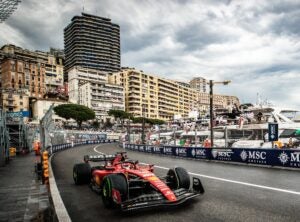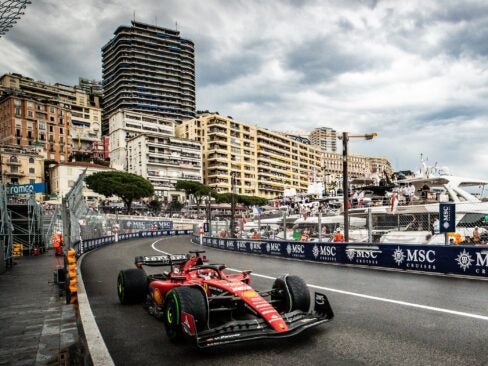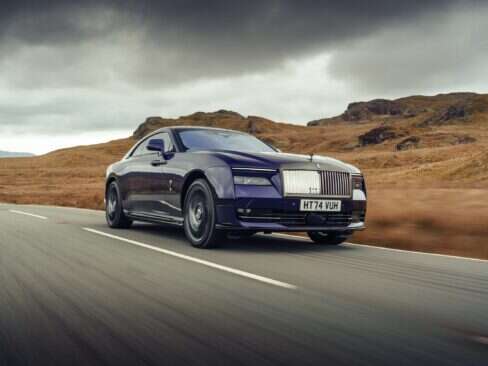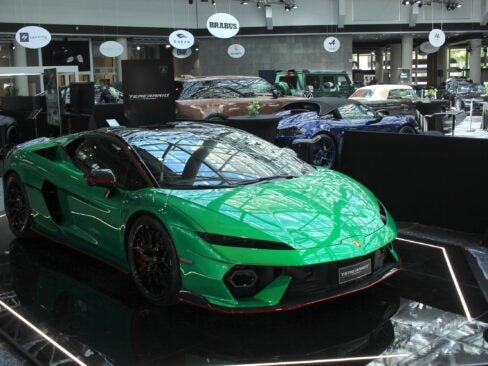Our global love affair with the automobile dates back to the late 19th Century, when inventors from Germany, France and North America began updating steam-powered buggies into four-wheel, petrol-powered cars.
 While the preferred mode of transport is, of course, private jet, there is something to be said for the beauty of the open road.
While the preferred mode of transport is, of course, private jet, there is something to be said for the beauty of the open road.
Naturally, all manner of motorsport contests sprung up soon thereafter. In July 1894, French magazine Le Petit Journal organized a “Competition for Horseless Carriages” from Paris to Rouen. Thirty drivers competed to cover the 79-mile distance. The winning time was six hours and 48 minutes, with an average speed a riveting 11.8 miles per hour.
Fast forward 40 years, and cars started gaining considerable speed. By the 1930s, organizers would host races exclusively on closed courses, to prevent roadside accidents. Automobile companies like Bugatti, Alfa Romeo, Delahaye and Mercedes-Benz began transforming their top-tier road cars into high-speed racers, with multiple-stage supercharging, massive horsepower and speeds over 100 miles per hour.
These days, premier racing events span Abu Dhabi’s Formula One on Yas Island, the legendary Grand Prix of Monaco and Le Mans’ 24 Heures du Mans. These races bring together scores of fans, award-winning drivers from across the globe and what are inarguably the world’s most technologically advanced vehicles.
And the industry continues to evolve. Now, top manufacturers from Sweden to Southern California build vehicles that are never meant to be driven by mere mortals — or on the roads at all. This new breed of supercars is constructed with the sole intention of shattering records. Visionary manufacturers like Bugatti and Koenigsegg create these superpowered instruments for their superlative horsepower, acceleration and, of course, speed.
The competition is fierce. For proof, look no further than the April 2013 automotive controversy in The Guinness Book of World Records. A challenger threatened to dethrone the vehicle Guinness had crowned the world’s fastest car for three years running, providing seemingly unimpeachable numbers. It was a veritable record scratch of statistical records, and one heard across the industry.
After two weeks of careful deliberation, Guinness deemed the challenge invalid due to a technicality. The reigning champion remained, and auto enthusiasts everywhere breathed a sigh of relief.
With the number one spot firmly in place, read on for our ranking of the world’s fastest cars. The list ranges from Danish design stars, to Swedish eco-wonders, to pavement-burning Italian racers. Ladies and gentlemen, start your engines. 
Pagani Huayra, 230 mph
Italian manufacturer Pagani’s supercar is named after the Incan god of winds.
The Huayra has a twin-turbo, 6.0-liter V12 engine, a seven-speed automated manual transmission, and bold, gull-wing doors.
Prices for Pagani’s stylish speed racer start at $1.6 million. 
Zenvo ST1, 233 mph
Denmark’s addition to the high-speed game is both turbo- and supercharged.
Its 7.0-liter, V8 engine produces 1104 horsepower, and the supercar can accelerate from zero to 60 miles per hour in 3.0 seconds.
Only three Zenvo ST1s are produced per year. Prices start at $1.8 million. 
McLaren F1, 240 mph
A high-speed trailblazer for more than 20 years, McLaren revolutionized the auto industry when it introduced the iconic F1.
Only 106 of the legendary road cars were produced. The McLaren F1 has a BMW S70/2, 60-degree V12 engine, and a six-speed manual transmission.
Production on this living legend ceased in 1998, but prices started at $1,000,000.
McLaren recently announced plans to launch a 2015 F1, a segment sports car that will start at $700,000.
Koenigsegg CCX, 245 mph
The CCX was Swedish producer Koenigsegg’s first vehicle available in the American market.
Its engine was specifically designed to run on 91 octane fuel, which meets U.S. emission standards. It has 806 horsepower, and runs on a 4.8-liter, V8 engine.
The Koenigsegg CCX hits the road for no less than $550,000. 
Saleen S7 Twin Turbo, 248 mph
An American vehicle built entirely by hand, the Saleen Twin Turbo debuted in 2005.
Designed by Phil Frank, the S7 Twin Turbo is a limited-production model, with a twin-turbo V8 engine and six-speed manual transmission. It can accelerate from zero to 60 miles per hour in 2.8 seconds.
Prices for the carbon fiber chariot start at $555,000. 
Bugatti Veyron Grand Sport Vitesse WRC, 254 mph
The appropriately named World Record Car (WRC) is the world’s fastest convertible production car.
The Grand Sport Vitesse WRC has a quad-turbocharged, 7.9-liter W16 engine that produces 1,106 lb-ft of torque. It can accelerate from zero to 60 mph in 2.6 seconds.
Fittingly, prices start at $2.6 million. 
SSC Ultimate Aero TT, 257 mph
This American racer held the record for the world’s fastest car from 2007-2009.
It has a six-speed manual transmission and a 6.3-liter, twin-turbocharged V8 engine. It was produced and designed by SSC’s Jerod Shelby.
Prices for this supercar start at $650,000. 
Koenigsegg Agera R, 260 mph
A distinctly Swedish design aesthetic sets Koenigsegg apart from many of the world’s other supercars.
Since its introduction at the 2011 Geneva Motor Show, the Agera R broke several world records for production cars, including an impressive acceleration speed of zero to 186 mph in 14.53 seconds. It is also notable for its commitment to bio-fuels.
For those who want a bit of Swedish ingenuity to call their own, the Koenigsegg Agera R starts at $1.5 million. 
Hennessey Venom GT, 265.6 mph
This modified Lotus Exige chassis has the quickest acceleration time in the world.
The Venom GT can accelerate from zero to 186 mph in 13.63 seconds, and has a 6.2-liter, twin-turbocharged V-8 engine.
Prices for the limited-edition supercar start at $1.2 million. 
Bugatti Veyron SuperSport, 268 mph
The reigning champion in speed since 2010, Bugatti’s Veyron is the world’s fastest supercar.
It has an 8.0-liter, W12 quad-turbocharged engine with 1200 hp, and a seven-speed DSG automated manual transmission. It accelerates from zero to 60 miles per hour in a mere 2.4 seconds, and can reach 100 miles per hour in 4.9 seconds.
Feel the need for speed? Prices for the world’s fastest car start at $2.5 million.









